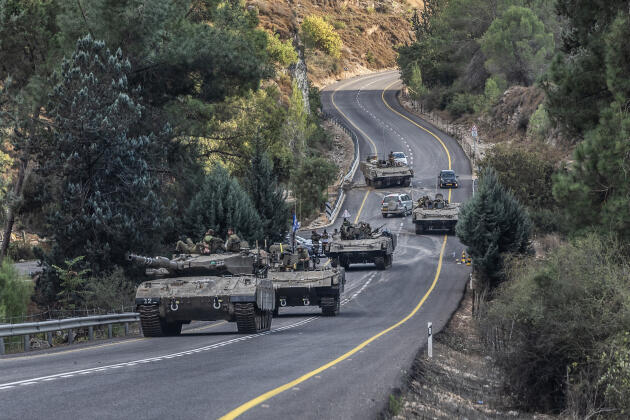With Ahmadinejad’s Finger on the Trigger
In fact, I would suggest that we are witnessing the results of a deliberate decision by the Iranian leadership to provoke Israel into attacking Hezbollah. Such an attack would mean launching a war on Lebanon, and if Iran has its way, it would involve Syria, and destabilize the entire Middle East.
Iran’s strategic goal is to trigger a war before it becomes the object of any serious sanctions at the UN Security Council, and before Israel or the United States decides to launch a military operation against its nuclear facilities.
Advertisement
The new Lebanese government is again dominated by Syria. It has accepted the strategy of the “resistance” and feels empowered by Hezbollah’s military might.
Syria has changed its traditional strategy of acting against Israel by proxy, and it too is ready to take the risk of a direct military confrontation, possibly with Iranian support. Foreign Minister Moallem, in comments early this month, called on Israel to “stop launching threats” against Gaza, southern Lebanon, Iran and Syria, and threatened that “war will be all-out, whether it hits south Lebanon or Syria.” According to a report in the Qatari daily Al-Watan, “a strategic decision has been taken not to allow Israel to defeat the resistance movements.”
One of Syria’s goals could be to exact revenge for Israel’s September 2007 air attack on its nuclear reactor. Damascus has had substantial success in reducing its diplomatic isolation, without making concessions in terms of its regional alignments or behavior. This may have emboldened the regime.
As for Hamas, Israeli defense sources report that Iran has supplied the Islamic resistance movement in Gaza with missiles capable of striking Tel Aviv, and that Hamas has recently tested them. This development could also embolden the organization’s leadership to strike at Israeli targets in case of a regional war.
According to an op-ed in the Gulf News by Sami Moubayed, editor-in-chief of Damascus’ regime-sanctioned Forward Magazine, Iran would not mind another war in Lebanon. There are certain radicals within Iran who are not pleased about the so-called “Lebanonization” of Hezbollah, which now plays an active role in national politics. They are “convinced that Hezbollah can strike back at Israel, surviving a war just as it did in 2006, inflicting maximal damage on Israeli cities and infrastructure.” These people believe Hezbollah would do well enough in a confrontation that the international community would think twice before pushing for another one with the organization – or, at a later stage, with Iran itself.
By this thinking, the United States, after the financial crisis and under the Obama administration, is weak and hesitant. According to Nasrallah, in a recent speech, “the failures of the [United States] … have led to a corrosion in the reverence with which the United States is viewed in the world, and to a strategic decline in the ability of the United States to take action, or to embark on new adventures.”
Finally, there is a growing effort to delegitimize Israel internationally, following the army operation in Gaza last year.
The trigger to war would likely be Hezbollah provocations: The Islamic organization blames Israel for the assassination of its military/terrorist commander, Imad Mughniyeh, in February 2008, and still promises revenge. Its deputy secretary-general, Sheikh Naim Qassem, said of late that avenging Mughniyeh’s death was “the least Hezbollah could do.”
A deployment of sophisticated anti-aircraft systems by Hezbollah would also constitute a casus belli for Israel.
In either case, Israel would be compelled to respond, not just against Hezbollah but against Lebanon generally, with the consequences being the promised Syrian intervention and regional expansion of the conflict.
In a replay on a much larger scale of the Gaza events of June 2006 and the Second Lebanon War that followed, Iran would probably not intervene directly, but it could be expected to back terrorist attacks on Israeli and Jewish targets, to provide weapons support and financial and economic aid to its allies, as well as the promise of massive participation in subsequent reconstruction.
President Mahmoud Ahmadinejad was scheduled to visit Damascus on February 25 for talks with Bashar Assad, supposedly to receive Damascus’ help to engage in a “constructive” dialogue with the West over Tehran’s contested nuclear program. In fact, Arab media were anticipating a meeting between Ahmadinejad, Nasrallah, senior leaders of the Lebanese opposition forces and Hamas’ Khaled Meshal. Such a meeting, said one press report, would serve as a clear message of “Iran’s support to them in the event of any Israeli aggression.”
It is reasonable to assume that Ahmadinejad’s trip was actually intended to coordinate with Iran’s regional allies the planned attack on Israel.
See the article at: https://www.haaretz.com/hasen/spages/1152511.html.
In this context I would like to draw your attention to a front-page article in the Syrian government daily Teshreen by columnist Muhammad Sadeq Al-Husseini, who is close to the Iranian regime, in which he predicted the imminent end of Israel in light of the new balance of terror that Iran has created vis-à-vis the West (Teshreen, February 24, 2010).
See MEMRI’s translation of the article at:
https://www.memri.org/report/en/0/0/0/0/0/0/3996.htm)
See also the aggressive and provocative declarations of Ahmadinejad during the last two weeks, ahead of his visit to Damascus on February 25:
https://www.memri.org/report/en/0/0/0/0/0/0/3997.htm
Last but not least, MEMRI points to recent articles in which editors of Arab dailies assessed that a war between Iran and the West is imminent, and did not rule out the possibility that the Arabs would take part in it:
https://freerepublic.com/focus/f-news/2457079/posts






